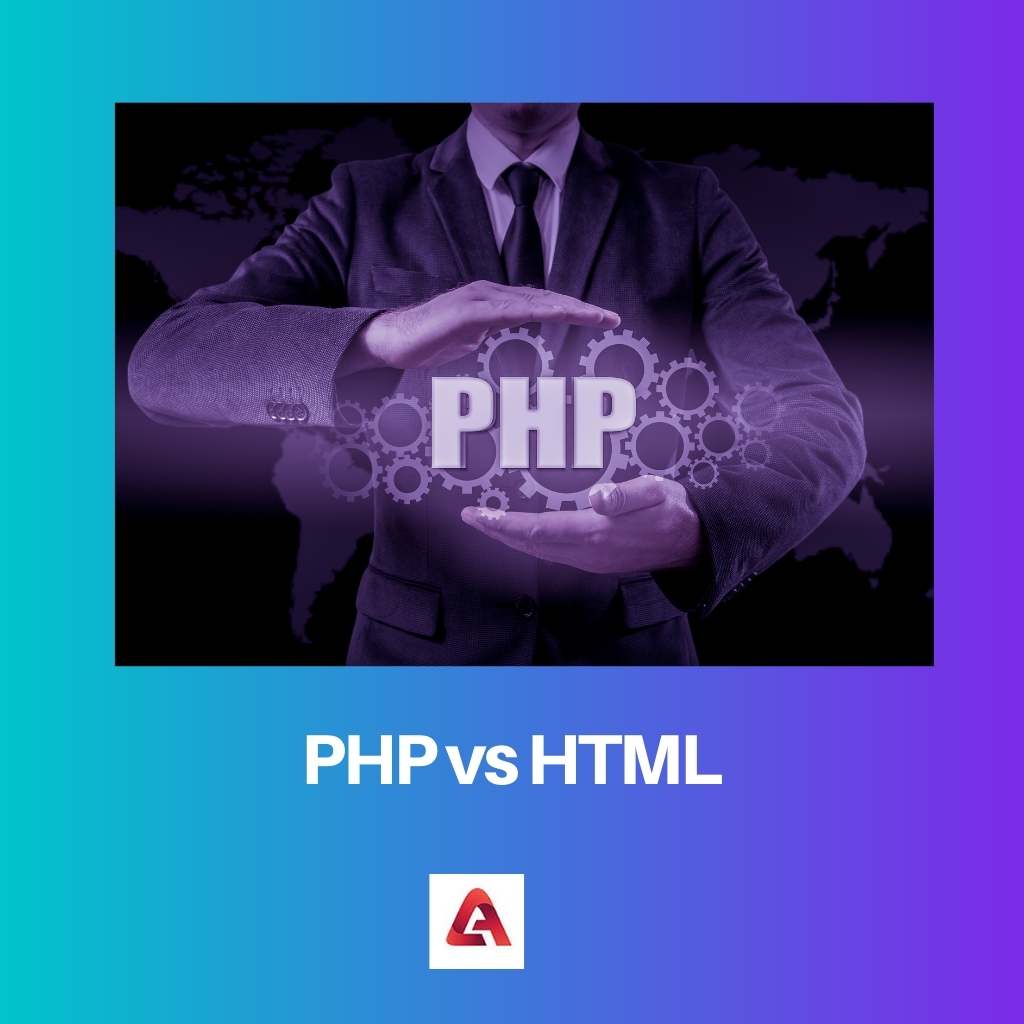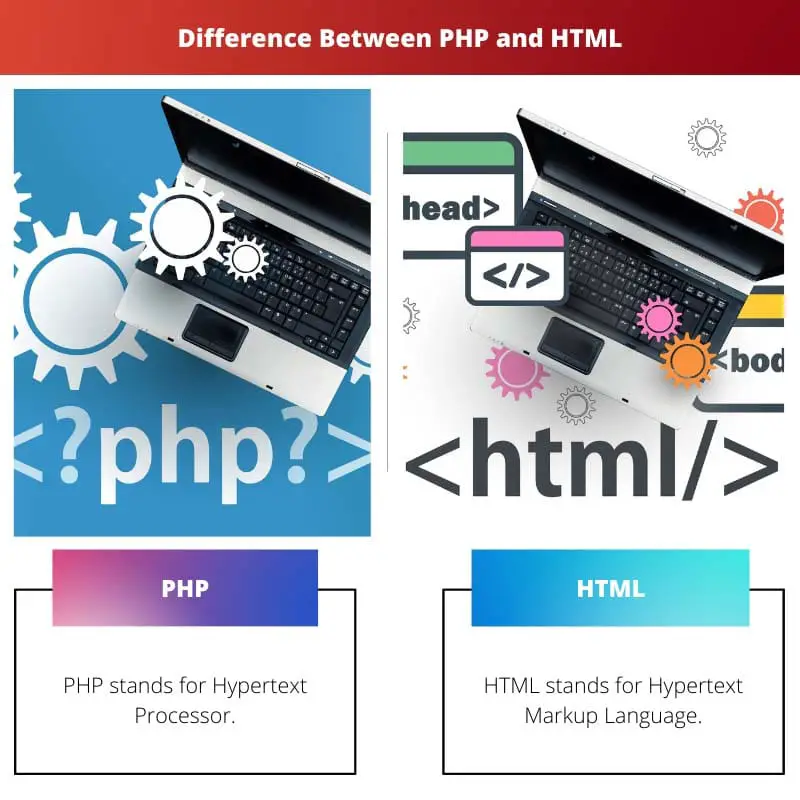Web Development and Web Designing have become some of the most desirable career choices in today’s world. For the growth and flourishment of any business, a good, wee-structured website is a key necessity.
The need for highly knowledgeable web developers will rise exponentially as the world moves into this fast-paced IT era.
Key Takeaways
- PHP is a server-side scripting language used for web development, while HTML is a markup language used to structure content on the web.
- PHP can interact with databases, manage sessions, and perform complex calculations, whereas HTML focuses on content presentation and layout.
- PHP code is executed on the server and generates HTML, which is then sent to the client’s browser for rendering.
PHP vs HTML
Hypertext processor (PHP) is a server-side programming language used to create dynamic websites and web applications developed by Rasmus Lerdorf. Hypertext Markup Link (HTML) is a client-side programming language used to create and structure contents on static web pages developed by Tim Berners-Lee.

PHP stands for Hypertext Processor. It is a back-end or server-side scripting language. The benefit of using PHP for creating web pages is that it allows users to make dynamic web pages.
PHP code is processed in the browser as HTML code; hence web pages can be created easily and with more features than using HTML.
HTML is the backbone of every webpage. HTML is the oldest scripting language for creating web pages and applications.
HTML stands for Hypertext Markup Language. Every browser works on HTML code.
HTML is used for performing the front-end creation of web pages. It allows users to make static web pages from the front-end client end.
Comparison Table
| Parameters of Comparison | PHP | HTML |
|---|---|---|
| Definition | PHP stands for Hypertext Processor | HTML stands for Hypertext Markup Language. |
| Created by | PHP is based on HTML and was developed by Rasmus Lerdorf | HTML is the first web page scripting language and was created by Tim Berners-Lee |
| Scripting process | PHP is used for back-end or server-side scripting | HTML is used for front-end or client-end scripting |
| Type of website | PHP allows users to create dynamic websites | HTML is used for making static websites |
| Extensions | Extensions of PHP are .php, .php3, .php4, .php7 | Extensions of HTML are .html, .htm |
What is PHP?
PHP is a scripting language used to create and maintain dynamic web pages and web applications. PHP stands for Hypertext Processor and is a powerful language with many features and advantages over other scripting languages.
PHP provides more functionality for creating dynamic web pages. Interactive websites can be created more easily using PHP, as it provides different customizable options that work on different webpage aspects.
PHP code is embedded into the web page. Thus the codes are operated on runtime, directly on the browser.
Thus, before the web page is presented, the browser processes the necessary PHP code, allowing the user to observe the changes on runtime.
PHP is open-source software, and thus there is no requirement for any compilation software for working on PHP. Every major browser can interpret and compile PHP codes, eliminating the need for any interpretation software.
The only drawback of PHP is that it requires a structured coding approach. Writing code blocks in a defined structure without overlapping is necessary for easy creation.
Unlike HTML, PHP does not display errors in code. Thus error combing and rectification becomes difficult.
Due to PHP’s advanced features, it requires more time to learn the language compared to simpler languages like HTML.

What is HTML?
HTML stands for Hypertext Markup Language. It is one of the oldest scripting languages for creating web pages and applications.
Computer scientist Tim Berners-Lee created it. It is used for creating static web pages from the front end.
This allows users to make websites from their client-side systems.
HTML is the first web page scripting language, and it uses tags for changing the aspects of the webpage, such as the background colour, font modifications, background and foreground texts, and so on.
Tags are essential parameters upon which a webpage is designed. These parameters pertain to the different aspects of the page of the website that is presented.
HTML is the first web page scripting language, so every browser works on the HTML code.
Thus this eliminates the need for any script editing software, as HTML code can be written on pre-installed software like Notepad and compiled directly on the browser.
HTML is limited in its functionality to create interactive web pages. HTML tags can only be used for making static pages.
Thus, other scripting languages, such as PHP, are used to create dynamic web pages with more functionality.
HTML is one of the easiest computer languages to learn, and proficiency in HTML can be built fairly quickly compared to other languages.

Main Differences Between PHP and HTML
- PHP stands for Hypertext Processor. HTML stands for Hypertext Markup Language.
- PHP is based on HTML and was created by Rasmus Ledorf. HTML is the first web page scripting language and was created by computer scientist Tim Berners-Lee.
- PHP language is used for back-end or server-side scripting. HTML is used for front-end or client-side scripting.
- PHP is a very powerful language and it allows users to create interactive and dynamic web pages. HTML is a comparatively weaker language and it is used for making simple and static web pages.
- The extensions of the PHP language are .php, .php3, .php4 and .php7. The extensions of HTML language are .html and .htm

- https://books.google.com/books?hl=en&lr=&id=7OjvOmol3CcC&oi=fnd&pg=PR9&dq=PHP&ots=1sQjcX6bv7&sig=5E7MonK3b2B66GWXb0zrll3tvqc
- https://books.google.com/books?hl=en&lr=&id=WuxxvP7RZasC&oi=fnd&pg=PT9&dq=PHP&ots=CHc9sxY2vx&sig=EeD-LLnKyLGpBer-GfGqrTSZLYQ
- https://www.immagic.com/eLibrary/ARCHIVES/SUPRSDED/W3C/W980424S.pdf
- https://dl.acm.org/doi/abs/10.1145/775152.775182
PHP and HTML are both important for creating and maintaining dynamic web pages and web applications, but PHP requires a more structured coding approach compared to HTML.
Web development and web designing are modern choices for career. It is essential for businesses to have good websites for growth. PHP and HTML has their own functionality and are both important for website development.
I agree, having a good website is essential for a business in today’s world.
However, the drawbacks of PHP seem to outweigh the advantages it offers.
The article provides comprehensive details about PHP and HTML functionalities, and their importance in modern web development.
This is an informative and helpful article for those interested in web development and web design careers.
It’s interesting to see the main differences and functionalities of PHP and HTML compared. Understanding their use cases is crucial for web developers.
However, HTML’s simplicity and ease of learning are also important factors to consider.
These differences give insights into why PHP is essential for creating interactive web pages compared to HTML.
The article provides a clear comparison between PHP and HTML functionalities. It’s interesting to delve into the technical details of both scripting languages.
Absolutely, the article gives a detailed insight into the functionalities of PHP and HTML.
Indeed, it’s valuable information for web developers.
The need for highly knowledgeable web developers is undoubtedly rising with the fast-paced IT era.
If businesses want to thrive in today’s world, a well-structured website is crucial. It is great to learn about PHP and HTML functionalities in this article.
Absolutely, understanding PHP and HTML is essential for developing and maintaining successful websites.